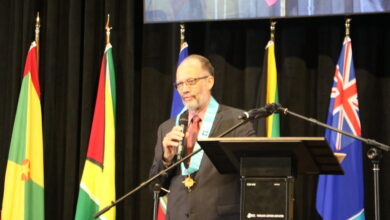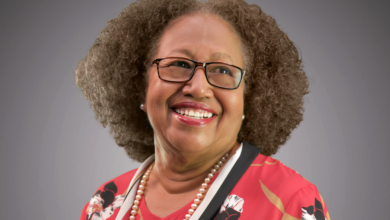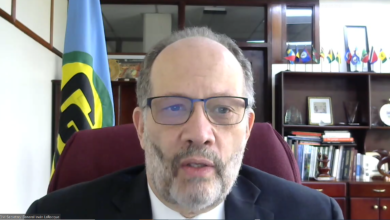(CARICOM Secretariat, Turkeyen, Greater Georgetown, Guyana) Caribbean Community (CARICOM) Secretary-General, Ambassador Irwin La Rocque, in Remarks to the Eighth General Meeting between CARICOM and its associated institutions and the United Nations (UN) System, today, 24 July, called for ‘strong collaborative action… to address urgently the criteria for access to concessional financing and the debt issue”. This, he emphasized, is most necessary for Small Island Developing and Low-Lying Coastal States (SIDS), including CARICOM countries, to achieve the 17 Sustainable Development Goals (SDGs) under the Post-2015 Development Agenda.
Ambassador La Rocque framed his call in the context of the heightened global engagement on development issues and the unique opportunities presented by the processes and outcomes of such engagement, including the Addis Ababa Action Agenda.
“The recognition in the Addis Ababa Action Agenda of the diverse and specific development needs and challenges faced by SIDS, most of which are middle-income countries, to achieve sustainable development is an encouraging sign for our Community”, he said.
The Secretary-General drew attention to the challenge of reduced access to concessional development financing by Member States; as a result of the designation of these States, excepting Haiti, as middle-income countries, based on the narrow and unique criterion of per capita income.
He emphasized the necessity of such financing to address ‘[CARICOM’s] formidable developmental challenges; citing as examples, small size, inherent vulnerabilities, susceptibility to exogenous shocks and a lack of resilience. According to Amb. La Rocque, a significant portion of the high level of indebtedness is due to these shocks and the reconstruction requirements after natural disasters.
In touching on a number of other developmental issues, including adaptation to and mitigation of the effects of Climate Change and transnational organized crime, the Secretary-General reiterated the need for effective partnerships for successful outcomes. He referred to the UN Secretary-General, His Excellency Ban Ki-Moon’s, call for strengthened partnerships when he addressed the High Level Dialogue, attended by a number of CARICOM Heads of Government, earlier this month in Barbados.
This Eighth Meeting follows on the Seventh Meeting held in July 2013. That meeting proposed priority areas for future collaboration, under the coordination mechanism for UN programmatic assistance led by the UN Development Group for Latin America and the Caribbean (UNDG-LAC).
This Eighth meeting will discuss a number of issues such as the integration and development of CARICOM, including its Strategic Plan for 2015-2019; SIDS Renewable Energy; Post -2015, FfD, Climate Change and Sea Level Rise; Violence against Children; alternative criteria to concessional financing; agricultural development and food and nutrition security; prevention and control of non-communicable diseases and pandemics; citizen security; among other issues.
The first Meeting of CARICOM and its associated institutions and the United Nations (UN) System was held in May 1997, immediately following the signing of the Cooperation Agreement between the Secretariat of the United Nations and the Secretariat of the Caribbean Community.





